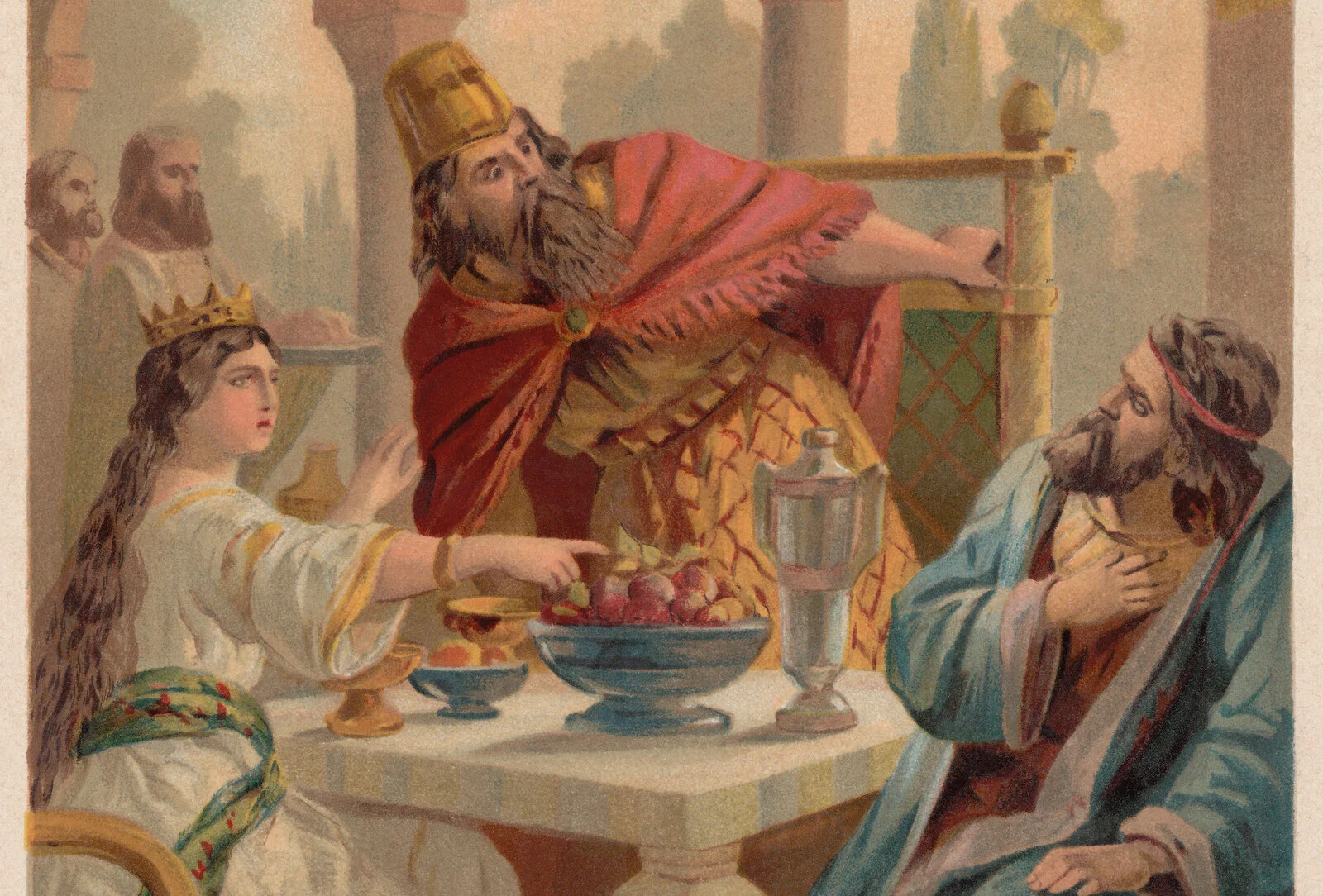A capable wife who can find?
She is far more precious than jewels.
The heart of her husband trusts in her,
and he will have no lack of gain.
She does him good, and not harm,
all the days of her life.
She seeks wool and flax,
and works with willing hands.
She is like the ships of the merchant,
she brings her food from far away.
She rises while it is still night
and provides food for her household
and tasks for her servant-girls.
She considers a field and buys it;
with the fruit of her hands she plants a vineyard.
She girds herself with strength,
and makes her arms strong.
She perceives that her merchandise is profitable.
Her lamp does not go out at night.
She puts her hands to the distaff,
and her hands hold the spindle.
She opens her hand to the poor,
and reaches out her hands to the needy.
She is not afraid for her household when it snows,
for all her household are clothed in crimson.
She makes herself coverings;
her clothing is fine linen and purple.
Her husband is known in the city gates,
taking his seat among the elders of the land.
She makes linen garments and sells them;
she supplies the merchant with sashes.
Strength and dignity are her clothing,
and she laughs at the time to come.
She opens her mouth with wisdom,
and the teaching of kindness is on her tongue.
She looks well to the ways of her household,
and does not eat the bread of idleness.
Her children rise up and call her happy;
her husband too, and he praises her:
“Many women have done excellently,
but you surpass them all.”
Charm is deceitful, and beauty is vain,
but a woman who fears the Lord is to be praised.
Give her a share in the fruit of her hands,
and let her works praise her in the city gates.
Cleary, what we need is another white, American, middle-class, cis-gender male waxing eloquent on the perfect woman; however, I will forbear. I have not read this passage in quite some time but now that I have, I am reminded not of the ideal Ancient Near Eastern woman (somehow I doubt I will ever meet one), but of other Old Testament women and their stories. Let us remember:
Miriam (Exodus 15)
She opens her hand to the poor,
and reaches out her hands to the needy.
She is not afraid for her household when it snows,
for all her household are clothed in crimson.
The first “prophet of the people,” Miriam’s prominence is surprising in a narrative dominated by Moses and Aaron. In Hebrew her name means “bitter water,” reminding us that it was she who first appealed to the bloodied water for salvation. She first intercessed on behalf of her brother in the presence of power, and when Moses (which means “drawn from water”) ran from Egypt, she remained, the stalwart intercessor and spiritual advisor for her oppressed people. Though Aaron receives pride of place as Moses’ mouthpiece and advisor, surely Miriam instructed her brother in prayer, service, hope and fortitude.
In Egyptian her name means “beloved”; she is indeed beloved by the Israelite people. Some Jewish sources have Miriam leading her people through the Reed (Red) Sea while her brother holds the water from the shore. During their journey, she leads them in their first Song of Deliverance, though it is now ascribed to Moses. The woman who saved the one through the water now marches her many through the sea.
Her ministry continues in the wilderness, though she is rarely mentioned. We are understandably concerned about the relationship between Moses and YHWH and the practical applications of the covenant they are proposing. I imagine Miriam had an active role in disseminating information and providing services for the people, not least of which as their representative to Moses. In Numbers 12, Miriam criticizes Moses for his divorce of Zippora and marriage to another woman. She is struck by God with a skin disease (though I think this is impulsive and regrettable) and is banished from the camp. Her people take up their prophet’s protest and will not leave until God heals their liberator; he does and only then do they continue moving.
Miriam participates in one other, life-long protest. She remained childless. She witnessed the atrocities done to her people when she was young; as a result, she dedicated her life to her people. She was childless, but not without family. Israel is her children. Though she saw and participated in the liberation of her own people, she resisted adding to the number of suffering agents in this world. God rescued some, but his work is not done. While she lived, she preached hope to the oppressed, led them out of slavery, fed them in the wilderness, and even provided water to them. Like Moses, she is a water diviner; she had her own well in the wilderness that watered her people. When she died, her water dried up. She gave everything for her people and is rewarded with immortality in her name: Miriam - Mary. Moses learned from her, perhaps God did too. Her life inspired him to complete his own work so he came through the waters of birth by his own Mary, to finally liberate his people - all of them.
Tamar (Genesis 38):
She makes herself coverings;
her clothing is fine linen and purple.
Her husband is known in the city gates,
taking his seat among the elders of the land.
She makes linen garments and sells them;
she supplies the merchant with sashes.
Tamar’s story is one in kind with Jacob and Joseph. She cunningly employs the use of clothing and knowledge of family history to achieve her own family. The death of her first husband, the spoiling of possible children by her brother-in-law, the denial of another husband and her indefinite languishing in widowhood with no hope for children encourage her to take matters into her own hands. She dresses as a harlot, posts in front of the city gates and lures her father-in-law to sleep with her. This is the man who refuses to provide her with a husband/children from one of his sons. This man, Judah, is a son of a deceiver, who himself had just deceived and is being now deceived. Tamar is rewarded with twins for her cunning.
Sarah (Genesis 18:9-14; 20):
Strength and dignity are her clothing,
and she laughs at the time to come…
Charm is deceitful, and beauty is vain,
but a woman who fears the Lord is to be praised.
Give her a share in the fruit of her hands,
and let her works praise her in the city gates.
The references to laughter, beauty and fruit here remind me of the first matriarch, Sarah. The first passage indicated in the heading, Gen. 18:9-14, recounts her eavesdropping on the conversation between her husband and God, where she laughs when she hears she will bear a son. God, huffy that someone would scoff at such a grandiose promise responds, “Is anything too difficult for the Lord?!” Sarah does indeed bear a son and following God’s instructions names him Isaac, which means “laughter” or “mockery” depending on your humor.
The other reference, Genesis 20, tells of how Sarah, with the help of Abraham, forces God to open her womb and act justly. This is a long story, so buckle up. There’s a lot of context, subtext, and pretext to consider, as well as some ancient history, in order to understand and appreciate Sarah’s boldness in holding God to his promises. I am also taking some liberties with interpretation, using what Wilda Gafney calls “my sanctified imagination”.
The chapter immediately follows the destruction of Sodom and Gomorrah, the central point in the Abraham-Sarah story. The story turns when Abraham confronts God with his accusation: “Will the God of justice not act justly?” Old Testament justice is of the type - “give what is owed,” lex talionis, an eye for an eye; a promise made, a promise fulfilled. God had arrived after “hearing the great outcry of the city,” giving to the city what is owed - destruction. But what of promises not fulfilled; what of justice deferred? In his accusation, Abraham reminds God of this. At this point, God had promised Abraham and Sarah a number of things, not least of which progeny that had been promised five times (by my count) over the span of several decades. Yet, after years of deferment and despite the obedience of Abraham and Sarah, she had not received what was owed. The God of justice has not acted justly. Sarah will have her justice.
We also need to remember the events of Genesis 12. Genesis 20 is a repeat of Genesis 12. In the earlier narrative God appears to Abraham, a random person, offering a bargain: wealth, prosperity and so many children he will be like a great nation - if he moves his family to an undisclosed location. Abraham complies, keeping his deal of the bargain, settling in Canaan. There is a plague in the land and Abraham is forced to flee to Egypt where Abraham pimps his beautiful wife out to the Pharaoh who gives Abraham “sheep, oxen, donkeys, male and female slaves, female donkeys and camels” (Gen. 12:16). Basically, the wealth God promised them, but not the child.
In Iron Age sexual politics, nothing excludes surrogacy; indeed, to help God fulfill his promises of children, it may be the best option, especially at their age (Abraham was 75, Sarah probably 65). What is also included in Iron Age sexual politics is the allusion of sex to farming. The woman’s womb is the ground, the man’s sperm is the seed. If the ground is fertile, and the seed good, fruit will result. If either the ground is infertile, or the seed bad - no fruit, no children. For Abraham and Sarah, though they are old, they do not know yet which is bad: Sarah’s womb, or Abraham’s seed. We should not diminish the injustice Sarah experienced being given over to another man. The injustice is compounded when she lives with the Pharoah “as a wife” (sexual relations implied) long enough to begin suspecting that she bears the curse.
Sarah’s curse is confirmed in Genesis 16 where she tests the fertility of Abraham’s seed with her slave, Hagar. Abraham is not shooting blanks. Hagar bears a son, but God wants only the fruit of Sarah’s womb. God’s refusal to cede control is confirmed when Abraham pleads to God that Ishmael, the son with Hagar, be accepted, but God refuses (Gen. 17:17-20). Three times God had promised Sarah children - what is so special about her womb that the child must originate there?
Immediately after God’s refusal to accept Ishmael as the promised child, God quickly promises Abraham and Sarah twice more a child. Abraham is now one hundred years old and Sarah ninety. Now we are ready to consider the events of Genesis 20. Abraham and Sarah sojourn in a foreign land and Abraham again portrays his wife as his sister and she is taken by the local king. Crucially missing is Abraham’s motivation for this repeat. Before, Abraham was fearful that someone would kill him in order to take his wife. Here, no fear is mentioned. Once the king, Abimalech takes Sarah, God appears to him and rebukes him. Abimalech explains himself, “Lord, will you slay a nation, even though blameless...did she not herself say, ‘He is my brother?’” The first sentence is a reformulation of Abraham’s question at Sodom and Gomorrah, the final sentence makes Sarah an active participant in this deception.
Why would Sarah participate in this foolishness, willingly risking her body to more abuse? She is taking back control of her body; she is unwilling to be manipulated by the men in her life (Abraham and God) any longer and is making public God’s injustice. Immediately, after Sarah is taken, God appears in a dream to king Abimelech, like a jealous lover - “You are a dead man, that woman is married!” God does not say “married to a man”; should we think that God considers Sarah his wife? Sarah, willingly agreeing she is unmarried, elicits a response from God who considers himself her true husband. After all, only through his power, his initiative, his timing will Sarah conceive.
Of course, Abimalech did no wrong; neither did Sarah. She positioned herself as the victim. Abraham, perhaps, could be culpable for lying, but his lie is one of omission (Sarah really is his sister, he just failed to mention she also is his wife). No, attention is clearly directed toward God who cannot discern injustice. After Abimalech’s defense, God admits that the king had done nothing wrong, going so far as to claim responsibility for Abimalech’s restraint, “...and I also kept you from sinning against me; therefore I did not let you touch her” (Gen. 20:6). The king did no wrong; I would expect God, the judge of all the earth to act justly by telling Abimalech to give Sarah back and everything will be fine. But God qualifies his response, “Now, therefore, restore the man’s wife, for he is a prophet and he will pray for you and you will live” (Gen. 20:7).
Sarah is not done. She needs to force her husband’s hand a little more. She whispers to Abraham to not intercede, but to force Abimalech to offer a bribe to be rid of them. The king gives Abraham everything, just like the Pharaoh before him: livestock, slaves, land (anywhere he wants) and gives Sarah 1000 pieces of silver and says to her, “It is your vindication.” Does God not hear these words? They ironically allude to Sarah’s missing child, her only true vindication. God should speak these words, not Abimelech.For the second time in this way, God’s promises to Abraham and Sarah are partially fulfilled. Only after the bribe has been paid does Sarah have Abraham pray to God and God lifts the curse. The curse God put on Abimalech, the means of annihilation, was infertility - God closed fast their wombs. If God cannot hear the injustice, Sarah is sure he sees it. God cannot allow the innocent to suffer and call himself just. No longer can he deny Sarah, similarly innocent. The first words of the following chapter read, “Then the Lord took note of Sarah as he had said and the Lord did for Sarah as he had promised.”
Sarah was promised a child and her body was not her own. Control was shared between Abraham and God. Genesis 20 tells the story of a woman (behind the scenes as women often are) fighting for control over her body and legacy; fighting for justice denied her. She drags her family through a curse to the threshold of a promise long witheld. The victim before, she now demands the God of all justice act justly.
I know this post has been tangential at best; but “the Proverbs 31 woman” is a specter of femininity, and there are many ways to be a Biblical woman. You can rise early and care for your household (the actual Proverbs 31 Woman, I forgot we were talking about her). You can drive a stake through a guy’s head while he’s asleep (Deborah). You can seduce a superhero-type dude with long hair and steal his magic powers (Delilah). You can call out a king’s hypocrisy after he dances naked in the streets (Michal). Maybe Ruth and I will write a Proverbs 32 woman who includes these attributes. Anyway, read the Old Testament, it’s fun.








